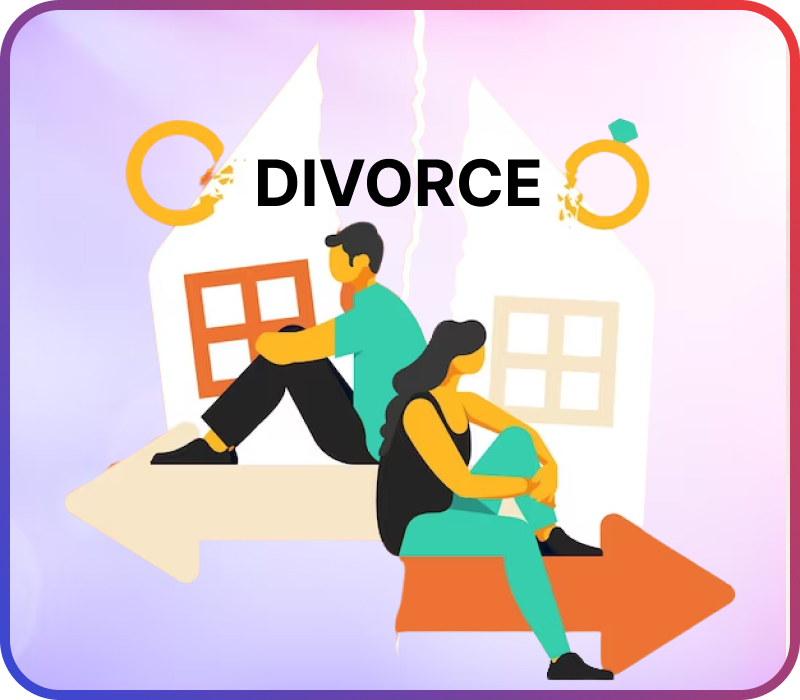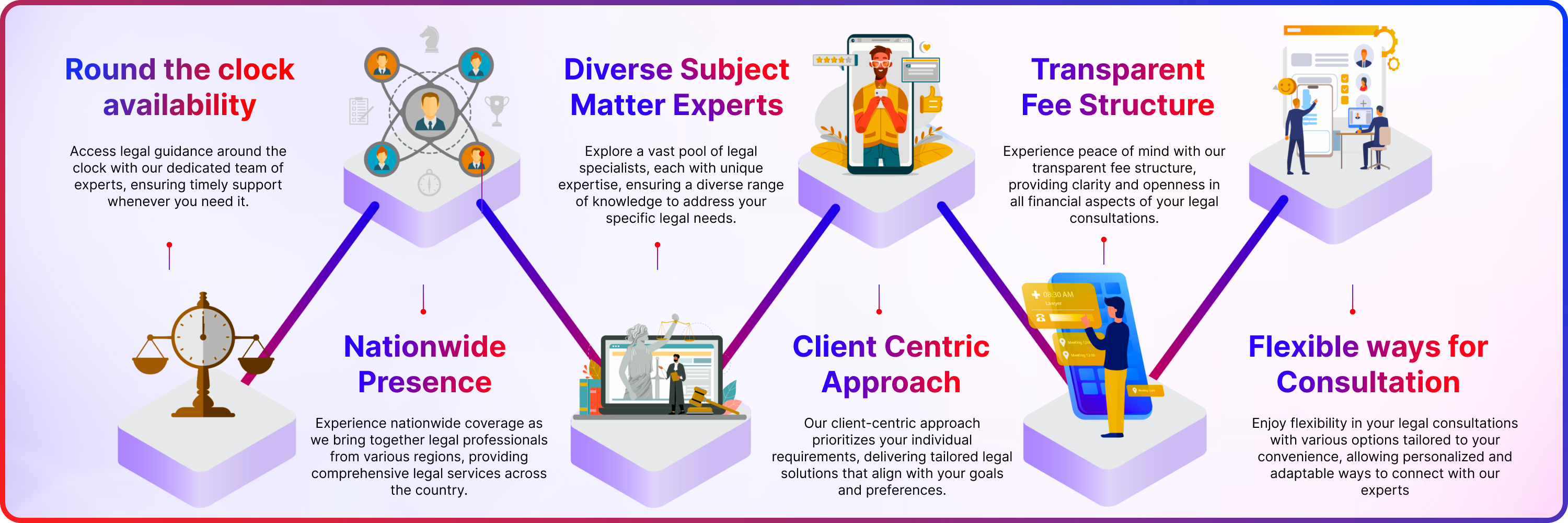Divorce is a crucial step for the couples. It must be understood that the divorce is a huge decision which could be emotionally, psychologically, as well as financially draining. Having a proper understanding of the entire process will ultimately help you make wise decisions during the proceedings.
One of the most important and sacred part of our culture is marriage. However, with time, the thoughts and beliefs of the society towards marriage are changing continuously. The laws related to divorce are also being continuously changed as per the changes in the society.
In the past, there were fewer cases of divorce, but with times, the mindset of people has also started to change as there have been more incidents of divorce, with couples deciding to separate if are not able to continue the relationship.
...Read More
In the past, there were fewer cases of divorce, but with times, the mindset of people has also started to change as there have been more incidents of divorce, with couples deciding to separate if are not able to continue the relationship.
The Laws Governing Divorce In India
It provides for the matter of marriage and divorce for Hindus. The Act, based on the facts of the case, must be read along with other legislations as well, for instance, the Hindu Adoption and Maintenance Act etc.
It applies where individuals belonging to two different religions marry each other. As could be understood form the name of the Act, it deals with special situations where couple belonging to two different religions or sects have decided to tie the knot. The Act reflects the liberal and progressive mindset of the legislature and by extension the society.
This Act governed the matters of divorce of Christians in British India.
Muslim personal law is basically a set of customs and Sharia, collectively known as Laws of Sharia. For most part the Muslim Law is based on the rules enshrined in Holy Quran, with rules slightly different for different sects, i.e. Shias and Sunnis.
The Hindu Marriage Act, 1955 provides for the provisions related to divorce in most cases. The Act provides protection to rights of both parties involved in a marriage.
The Hindu Marriage Act, 1955-
This Act applies to-
Divorce laws- A brief history
Divorce was basically introduced around the year 1869, majorly for christians who wished to seek divorce legally. There were no legal provisions present in India formalising divorce In India at the time.
It was after a period of 8 years post independence, that the Parliament of India enacted the
the Hindu Marriage Act in 1955.
Types of Divorce Petitions
The HMA provides for two kinds of divorces, availed by a couple. They are-
The provision for Divorce with Mutual Consent is provided under Section 13-B of the Act. the concept was introduced in the year 1976, which allows a couple to apply for a divorce amicably by agreeing to a divorce settlement, where the role of court would only be limited to administrative functions. The couple would decide upon the terms of the divorce. The parties could come together and file a joint petition for divorce in the Court. A divorce by mutual consent is relatively cheaper as well as would take a shorter amount of time as compared to the contested divorce.
Divorce without mutual consent, also referred to as Fault Divorce or Contested Divorce, its provisions have been provided under Sections 13 (1) & (2) where various grounds have been provided based on which either of the spouse could file for a divorce in the court of law-
An irretrievable breakdown of marriage could be defined as a failed marriage, where there is no possibility of reconciliation amongst the couples. At present no legislative provision is there related to this theory. However, in 2010, Marriage Laws Amendment Bill was introduced which was passed in the Rajya Sabha, it provided for the inclusion of a Section 13C in the HMA. The Supreme Court, though, in exceptional cases has granted a divorce based on the ground of IRB theory.
Grounds of Divorce
The ground based on which either of the partners could apply for divorce, have been discussed here under-
Documents Necessary When Filing for Divorce:-
In a petition for divorce, the parties may be required to submit the following documentary proofs:
Procedures of Divorce
Discussed here under in simple terms is the procedure for divorce amongst the parties-
Sharks of Law offers you lawyers who could assist with the process of mediation and litigation in order to achieve favourable outcomes, as well as ensure that the clients achieve favourable outcomes.
Other Matters Related to Divorce-
When a couple decides to file a Divorce by Mutual Consent, they have the right to divide the matrimonial property as they deem necessary. However, in case of an absence of consent, the Court may decide over the matter of property. During divorce the couple have the right to decide over matrimonial property only and not on the individual self acquired property.
The provisions for maintenance for wife is provided under Section 125 of the Code of Criminal Procedure and even under the Hindu Adoption and Maintenance Act, 1956. During the trial of these proceedings the property of the couple would be considered by the Court.
The provisions related to child custody and guardianship is provided under the Guardians and Wardens Act, 1890. The custody of the child could be
Maintenance and Alimony During and After Divorce-
Lawyers at Sharks of Law offer you legal counsel with property division, child custody arrangements well as negotiations during maintenance and alimony.
Factors to be Considered When Deciding Maintenance and Alimony:
A number of factors are considered when the Court decides upon the matters of maintenance and alimony, including future expenses, lifestyle expenses of the couple, education cost for children if any, inflation, as well as any medical expense which may occur, and many more.
The amount to be paid as maintenance shall be decided based on the financial ability of the parties and enough proof for their financial standings is required to be submitted. After the amount of maintenance has been provided, the defendant would be bound by law to provide maintenance and alimony as per the judgement of the Court.
How much would it cost in case of a divorce ?
The cost of filing for a divorce may seem to be very small, varying from state to state, which is generally around Rs 100 to 200, however the major payment during a divorce procedure would be paid to the divorce lawyer.
The fees of the lawyer may vary depending upon the place the case has been filed, the experience and knowledge of the lawyer, etc. Hence, it is advised to have a proper talk with the lawyer regarding proper fee management as applied by him or her, before appointing them.
Conclusion
Divorce is a crucial step for the couples. It must be understood that the divorce is a huge decision which could be emotionally, psychologically, as well as financially draining. Having a proper understanding of the entire process will ultimately help you make wise decisions during the proceedings.
Therefore, it is advised to appoint an experienced advocate from Sharks of Law who can assist you with the same. It is necessary that you appoint a divorce lawyer from the Sharks of Law to file your case properly, he or she should be well informed and should be able to predict the difficulties as well as nuances of the divorce case and deal with any sudden change in the facts or circumstances.
Sharks of Law offers you expert guidance in divorce cases, where our lawyers provide you with personalised legal strategies based on the facts of your cases. Our lawyers could help you deal with the complex legal structure involved in divorce proceedings including other variables such as property matters, maintenance, child custody. In case, you wish to seek free legal counsel, you may contact us.
FAQs
Mutual divorce could be completed within a period of about 6 to 18 months. However, the time period taken for entire procedure of divorce to be completed would be based on the facts of the case.
Yes, it is possible to apply for divorce by wife only. For further information as to on what ground could she file for divorce, it is advised that you contact an experienced divorce lawyer.
A term used for divorce, when the couple seeking divorce is 50+ in age.
Yes, if the husband denies to divorce, he would have to provide evidence as to why such divorce is not necessary.
One may apply for a divorce by mutual consent, where the parties agree to terms of divorce on their own, the time for divorce would be cut short.
...Read lessConsult with experienced Lawyers across expert areas




Take a look at the glowing reviews and success stories from some of our happy customers to see how (CompanyName) can help your business achieve its goals.